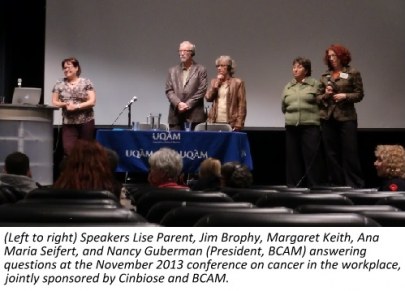By Ana Maria Seifert, PhD (Community Health); Union adviser on occupational health and safety, Confederation of National Trade Unions / Confédération des syndicats nationaux (CSN).
On November 7, 2013, Breast Cancer Action Montreal, together with the Centre for the study of biological interactions in human health (CINBIOSE) and the Institut santé et société of UQAM, hosted a conference on the subject of "Work and breast cancer: the importance of research and prevention." It should be noted that these organizations do a remarkable job of informing the public about toxicants and their impact on health, and putting pressure on governments to regulate toxicants found in consumer products and in the workplace.
The talk was given by Ontario researchers Jim Brophy and Margaret Keith to an audience of approximately fifty people, many of whom were from the labour movement. It was followed by a presentation by Lise Parent, a professor at TÉLUQ and a member of CINBIOSE, and with commentary by me. The work being done by these researchers is very important, especially because it is still difficult to have work-related cancers acknowledged despite the fact that the link between cancer and the workplace has been known for centuries. In fact, the very first formally recognized cancer was work-related: it was cancer of the scrotum, which was found among London chimney sweeps in 1775. In the 1920s, a cancer known as radium jaw was identified among female factory workers in New Jersey, caused by licking their paint brushes into a point when applying luminescent radium paint to watch dials.
With the exception of lung cancer, occupational cancers are largely unrecognized by doctors and workplace health and safety organizations. Moreover, patients don't always make the connection between their cancer and their exposure to carcinogenic agents. This link is hard to establish because cancers can take decades to develop and workers often don't know if they have been exposed to carcinogens. This is the case for breast cancer, for which a link to the workplace has yet to be determined—and that is why the work of Jim Brophy, Margaret Keith, and their collaborators is so vital.
Brophy and Keith reminded us that breast cancer—the most commonly diagnosed cancer among Canadian women—is caused by a range of environmental, genetic, hormonal, and lifestyle factors. Recent studies seem to point to the interaction of carcinogens and endocrine disruptors as being particularly significant in the onset of the disease.
In a study aimed at a better understanding of the link between breast cancer and work-related exposure to dangerous chemicals, 1,006 women with breast cancer and 1,146 healthy women were questioned about their work history as well as their risk factors such as number of pregnancies, age of onset of menstruation and menopause, and lifestyle choices (tobacco use, alcohol consumption, etc.).
Researchers concluded that there is a statistically significant link between work and the risk of developing breast cancer among women working for ten years or more in jobs entailing high exposure.
Their results showed a significantly higher risk in four occupational groups (agriculture, 36% higher risk; plastics and food canneries, more than twice the risk; machining, smelting and metalworking, 73% higher risk). The products that could account for these higher risks include pesticides or their residues; carcinogens and endocrine disruptors released by plastics; emissions associated with the polymers used to coat the insides of food cans; and, emissions from metals.
In her talk, TÉLUQ professor Lise Parent presented additional information to explain the health effects of exposure to endocrine disruptors.
In my own presentation, I made the point that this research brings us one step closer to recognizing the importance of preventing exposure to carcinogens. At the CSN, we strongly believe that prevention is crucial and that we must eliminate dangers at their source, or at least limit exposure as much as possible. Our representatives have ardently advocated for research into occupational cancers.
We are convinced that knowledge emerging from research, together with actions on the part of academics and community organizations such as Breast Cancer Action Montreal and the union movement, can improve the current state of affairs.
In our day-to-day work, we struggle to force certain employers to clean up their workplaces, even where recognized carcinogens are involved. Some of our members work in the occupations highlighted in this research. The researchers' findings will support our work on prevention and our demands for improvements, for example, with respect to ventilation during certain processes such as washing food cans, or during exposure to solvents and metal fumes.
With respect to cancers that affect women, non recognition of the particular conditions of women's work makes our task even more difficult. And yet, CINBIOSE has demonstrated that women are sometimes more heavily exposed to carcinogens. In the horticultural sector, for example, women working in close proximity to plants can suffer greater exposure to pesticides.
The CSN is working hard to bring about the acknowledgement of occupational cancers, both for the sake of the victims and because we believe that such recognition will step up the pressure to implement preventive measures.
However, it has been hard for us to gain any acknowledgement of the fact that workplace exposure can either cause or contribute to the development of cancer. In 2009, three women working in the sterilization unit of a Montreal hospital applied to have their cancers recognized as work related. They connected their cancers to their exposure to ethylene oxide, a suspected human carcinogen used in cold sterilization. Their exposure was due to noncompliance with the length of time required for the evaporation of this chemical when instruments were removed from the sterilizer, or to the fact that the sterilizer was being opened before the end of the cycle because instruments were needed for surgery. Despite all our efforts, their request was denied.

